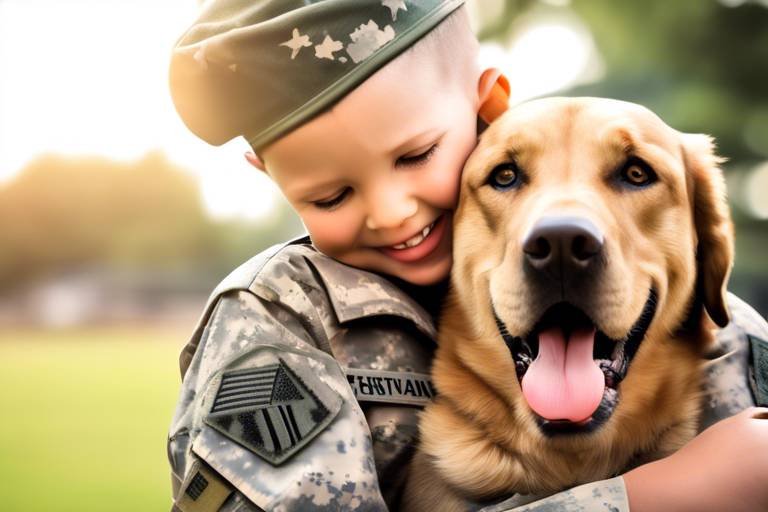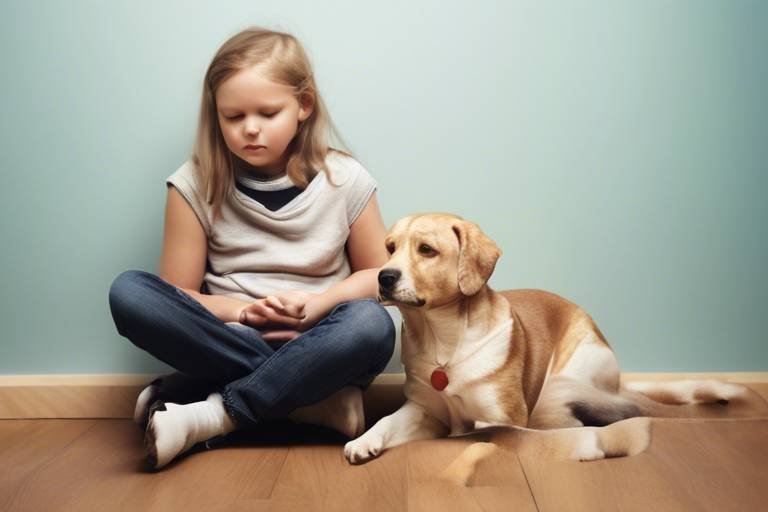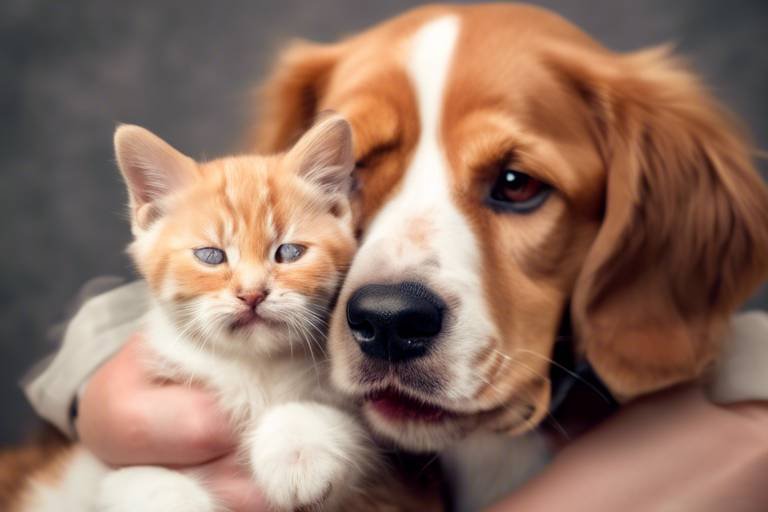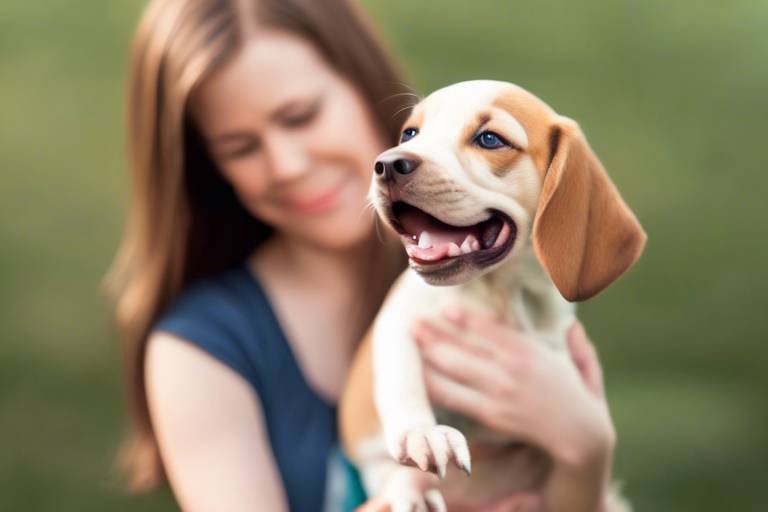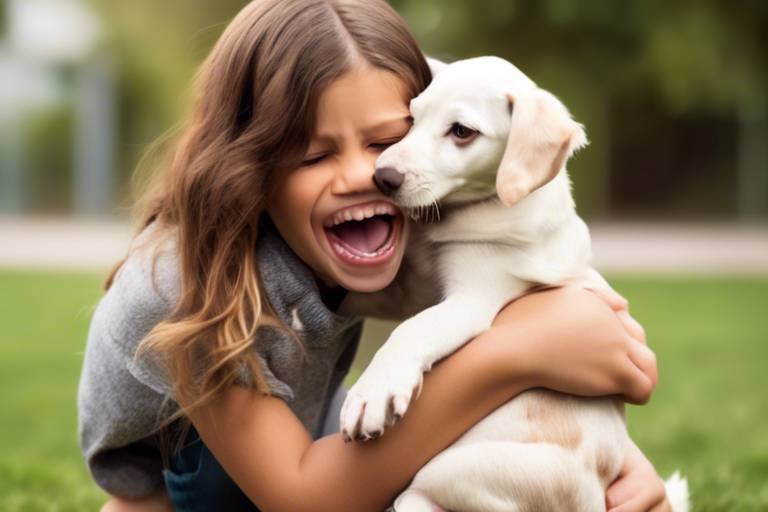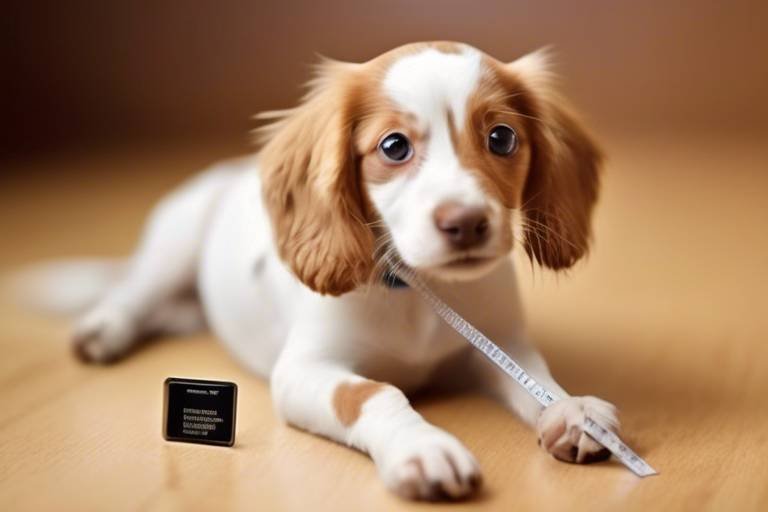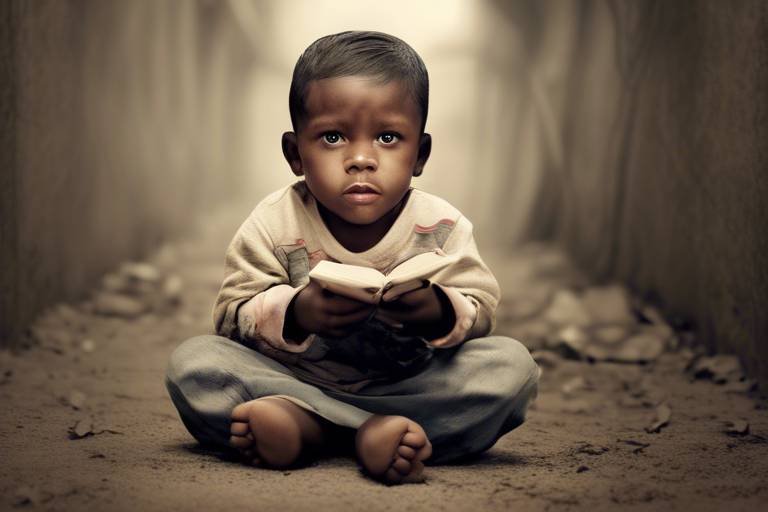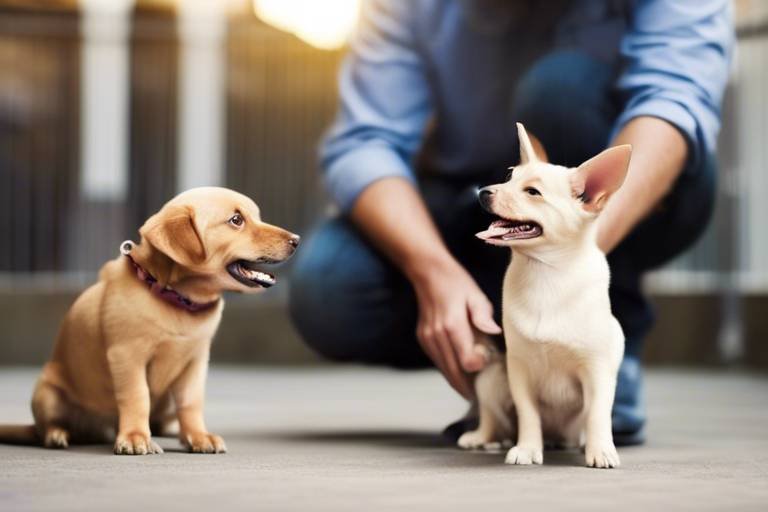The Benefits of Pet Adoption for Military Families
In today’s fast-paced world, military families face unique challenges that can often feel overwhelming. Frequent relocations, long deployments, and the emotional toll of military life can create a sense of instability. However, there is a heartwarming solution that can provide immense benefits: pet adoption. Bringing a furry friend into the home not only enhances the family dynamic but also offers emotional support and companionship. This article explores the various advantages that adopting a pet can bring to military families, from improving mental health to teaching valuable life skills.
One of the most significant advantages of pet adoption for military families is the emotional support and companionship pets provide. Imagine coming home after a long day, feeling the weight of the world on your shoulders, only to be greeted by a wagging tail or a gentle purr. Pets have an incredible ability to sense our emotions and offer comfort during difficult times. For military families, this can be especially beneficial during deployments or when adjusting to a new environment. The unwavering love from a pet fosters a sense of stability and can help ease feelings of loneliness and anxiety.
Adopting a pet can significantly improve the mental health of military families. Studies have shown that interacting with animals can reduce levels of anxiety and depression, providing a natural remedy for emotional struggles. The joy and unconditional love that pets bring can uplift spirits and promote overall well-being. Whether it’s taking a dog for a walk or simply cuddling with a cat, these interactions can release endorphins, the body’s natural feel-good hormones. It’s like having a personal therapist who’s always there to listen without judgment.
Pets serve as a source of comfort during stressful times. They offer a calming presence that helps family members manage the emotional toll of military life and transitions. For instance, when a service member is deployed, the family left behind may experience heightened stress and anxiety. A pet can provide a distraction, encourage physical activity, and create a routine that helps alleviate some of that stress. The simple act of petting a dog or cat can lower blood pressure and promote relaxation, making a pet an invaluable companion during tough times.
Caring for a pet can help military families build resilience. The responsibility of looking after an animal encourages family members to work together, fostering a sense of teamwork and unity. This shared experience can strengthen family bonds and provide a sense of purpose during challenging periods. Just as soldiers are trained to adapt to new situations, families with pets learn to navigate the ups and downs of life together, creating a support system that can weather any storm.
Pets require daily routines, which can help military families establish structure and stability amid the uncertainties of military life. Feeding, walking, and playing with a pet can create a sense of normalcy, providing a comforting rhythm to daily life. This routine not only benefits the pet but also enhances the overall quality of life for the family. It’s like having a built-in schedule that encourages everyone to come together and engage in meaningful activities.
Adopting a pet can significantly strengthen family bonds. When family members come together to care for and enjoy activities with their new furry friend, they foster teamwork and unity. Whether it’s going for family walks, playing fetch, or simply snuggling on the couch, these shared experiences create lasting memories and deepen connections. The joy of having a pet can transform a house into a home, filled with laughter and love.
For military families, pets provide an excellent opportunity for children to learn responsibility and empathy. Engaging in the care of their animal companions teaches kids about nurturing and understanding the needs of others. This responsibility can be especially beneficial for children who may struggle with the constant changes in their lives. It allows them to focus on something they can control and care for, instilling a sense of accomplishment and pride.
Caring for a pet teaches children valuable life skills, such as time management, nurturing, and understanding the importance of commitment. These skills are essential for their growth and development, preparing them for future challenges. Just like planting a seed and watching it grow, children learn that taking care of a pet requires dedication and consistency. This experience can help shape them into responsible adults who understand the value of commitment and compassion.
Pets can also encourage social interaction for military children. Moving to a new community can be daunting, but having a pet can serve as a great icebreaker. Children can make friends at the dog park, during walks, or through pet-related activities. Pets provide common ground for building relationships with peers, helping children feel more connected and less isolated in their new surroundings. It’s like having a social passport that opens doors to new friendships.
- How can I adopt a pet as a military family? Many organizations specialize in helping military families adopt pets. Check local shelters or military support groups for resources.
- What types of pets are best for military families? Dogs and cats are popular choices, but consider your family’s lifestyle and living situation when choosing a pet.
- Can pets really help with mental health? Absolutely! Pets provide companionship, reduce anxiety, and promote emotional well-being.

Emotional Support and Companionship
This article explores the various advantages pet adoption offers to military families, including emotional support, companionship, and the positive impact on mental health and family dynamics.
When it comes to the unique challenges faced by military families, emotional support and companionship can be game-changers. Imagine the comfort of having a furry friend by your side during those long deployments or the frequent relocations that come with military life. Pets have an incredible ability to provide a sense of stability and familiarity, making them more than just animals—they become family members.
For many military families, the emotional rollercoaster of deployment can feel overwhelming. The uncertainty, the anxiety, and the loneliness can weigh heavily on everyone involved. This is where pets shine! Their unconditional love and loyalty offer a comforting presence that helps ease the emotional burden. Whether it's a dog wagging its tail or a cat curling up in your lap, these little moments of joy can make all the difference.
Moreover, pets can serve as a bridge between family members, fostering connections that might otherwise be strained by the stresses of military life. Engaging in activities like walking the dog or playing with a cat can create shared experiences that strengthen bonds. It’s like having a common project that everyone can rally around, which can be especially important when family members are separated for long periods.
Here are a few emotional benefits that pets provide to military families:
- Reduction in feelings of isolation: Pets can help alleviate loneliness, providing companionship when family members are away.
- Improved mood: Interacting with pets releases endorphins, which can boost happiness and reduce stress levels.
- Increased sense of purpose: Caring for a pet gives family members a sense of responsibility and purpose, which can be particularly beneficial during tough times.
In essence, pets not only fill our homes with joy but also enrich our emotional lives. They teach us valuable lessons about love, patience, and the importance of being present. For military families, adopting a pet can be a transformative decision, offering a sense of normalcy and stability in an often chaotic world.
Adopting a pet can significantly improve mental health for military families, reducing anxiety and depression, and promoting overall well-being through the unconditional love and joy that pets bring.
Pets serve as a source of comfort during stressful times, offering a calming presence that helps family members manage the emotional toll of military life and transitions.
Having a pet can help military families build resilience, as caring for an animal encourages responsibility and provides a sense of purpose during challenging periods.
Pets require daily routines, which can help military families establish structure and stability amid the uncertainties of military life, enhancing their overall quality of life.
Adopting a pet can strengthen family bonds, as family members come together to care for and enjoy activities with their new furry friend, fostering teamwork and unity.
Pets provide an excellent opportunity for children in military families to learn responsibility and empathy, as they engage in caring for their animal companions and understanding their needs.
Caring for a pet teaches children valuable life skills, such as time management, nurturing, and understanding the importance of commitment, which are essential for their growth and development.
Pets can encourage social interaction for military children, helping them make friends in new communities and providing common ground for building relationships with peers.
Q: How can pets help military families cope with deployment?
A: Pets offer companionship and emotional support, helping to reduce feelings of loneliness and anxiety during deployments.
Q: What types of pets are best for military families?
A: Dogs and cats are popular choices, but smaller pets like rabbits or guinea pigs can also provide companionship without the need for extensive space.
Q: How can adopting a pet improve mental health?
A: Pets can reduce stress, anxiety, and feelings of depression through their companionship and the joy they bring into our lives.

Enhancing Mental Health
Adopting a pet can be a transformative experience for military families, particularly when it comes to enhancing mental health. The emotional bond that forms between a pet and its owner can act as a powerful antidote to the stresses of military life. Imagine coming home after a long day, feeling the weight of the world on your shoulders, and then being greeted by a wagging tail or a gentle purr. This simple act can lift your spirits and remind you that you are not alone. Pets have an innate ability to provide unconditional love, which is crucial for families facing the unique challenges of military life.
One of the most significant benefits of having a pet is their ability to reduce feelings of anxiety and depression. Studies have shown that interacting with animals can trigger the release of endorphins, the body's natural feel-good chemicals. This biochemical reaction can lead to a noticeable improvement in mood and a decrease in stress levels. For military families, who often deal with long deployments and the emotional turmoil that comes with them, pets can serve as a vital source of comfort. They become more than just animals; they become family members who provide emotional support during tough times.
Furthermore, pets encourage physical activity, which is another essential aspect of mental well-being. Taking a dog for a walk or playing with a cat can serve as a great way to get moving and engage with the world outside. This not only boosts physical health but also improves mental clarity and emotional resilience. The routine of pet care—feeding, walking, and playing—can create a sense of purpose and normalcy amidst the chaos of military life.
During stressful periods, such as a spouse's deployment or moving to a new base, pets can provide a much-needed sense of comfort. They are often keenly aware of their owners' emotions and can respond in ways that alleviate stress. For instance, dogs can sense when their owners are feeling down and may snuggle closer or nuzzle them in a way that feels reassuring. This intuitive connection can help military families navigate the emotional landscape of their lives, providing a calming presence that helps to manage the emotional toll of military life.
Caring for a pet also fosters resilience within military families. The responsibility of taking care of an animal can provide a sense of purpose and routine, which is especially beneficial during challenging times. When family members work together to care for their pet, they develop teamwork skills and a sense of unity that can strengthen their bond. This shared responsibility not only helps families navigate the ups and downs of military life but also instills valuable life lessons about commitment and care.
Pets thrive on routine, and their needs can help military families establish a daily structure. This routine can be particularly beneficial in providing stability during times of change, such as moving to a new location or adjusting to a loved one's absence. By incorporating pet care into their day-to-day lives, families can create a sense of normalcy and predictability that enhances their overall quality of life. The simple act of feeding, walking, and playing with a pet can become anchor points in an otherwise tumultuous environment.
In summary, adopting a pet can significantly enhance the mental health of military families. From providing emotional support and comfort to fostering resilience and routine, pets play a vital role in helping families cope with the unique challenges they face. The joy and companionship that pets bring can transform the military experience, making it more manageable and fulfilling.
- What types of pets are best for military families? Dogs and cats are popular choices due to their companionship and adaptability, but smaller pets like rabbits or guinea pigs can also be great options.
- How can a pet help with anxiety? Pets provide unconditional love and can help reduce feelings of loneliness and isolation, which are common contributors to anxiety.
- Is it difficult to care for a pet during deployments? While it can be challenging, many families find that pets provide a sense of normalcy and comfort, making the experience worthwhile.
Stress Relief and Comfort
In the whirlwind of military life, where uncertainty often reigns supreme, pets become a beacon of stress relief and comfort. Imagine coming home after a long day of training or deployment, and there’s your dog, tail wagging, ready to greet you with unfiltered joy. This simple interaction can melt away the weight of the day, reminding you that there’s a world outside of duty and obligations, one filled with love and companionship. The unconditional affection that pets offer can be a powerful antidote to the stressors that military families face.
Research shows that spending time with pets can lower levels of the stress hormone cortisol while simultaneously boosting the production of serotonin and dopamine, neurotransmitters that enhance mood and promote feelings of happiness. Just think about it: when you cuddle with your cat or take your dog for a walk, you’re not just engaging in a routine; you’re actively participating in a form of therapy that doesn’t require an appointment or a co-pay!
Moreover, the act of caring for a pet can provide a much-needed distraction from the pressures of military life. When you focus on your pet’s needs—whether it’s feeding them, grooming, or simply playing—you shift your attention away from your worries. It’s like taking a mini-vacation from stress, even if just for a few moments. This can be especially beneficial during times of deployment when families may feel isolated or anxious about their loved ones’ safety. Pets can help bridge that emotional gap, providing a source of comfort that is both immediate and fulfilling.
Additionally, pets can help establish a sense of routine, which is crucial for managing stress. The daily responsibilities of feeding, walking, and caring for a pet create a structure that can ground military families amidst the chaos. This routine not only helps to instill a sense of normalcy but also encourages family members to engage in activities together, further strengthening their emotional bonds. Just like a well-oiled machine, the family unit operates more smoothly when everyone has a role to play, and pets often become the heart of that operation.
In summary, the role of pets in providing stress relief and comfort cannot be overstated. They offer a unique blend of companionship, routine, and emotional support that is especially valuable for military families navigating the complexities of their lifestyle. So, if you’re considering adding a furry friend to your family, remember that you’re not just gaining a pet; you’re also welcoming a source of comfort, joy, and resilience into your lives.
- How can pets help with anxiety in military families?
Pets provide emotional support and companionship, which can significantly lower anxiety levels by offering a calming presence and a distraction from stressors. - What types of pets are best for military families?
While dogs and cats are popular choices, smaller pets like rabbits or guinea pigs can also provide companionship without the extensive care that larger animals require. - Can children benefit from having pets in a military family?
Absolutely! Pets teach children responsibility, empathy, and provide opportunities for social interaction, which are crucial for their development.
Building Resilience
In the whirlwind of military life, where uncertainty often reigns, is a crucial skill for families. Adopting a pet can be a transformative step in this journey. It’s not just about having a furry friend around; it’s about cultivating a sense of responsibility and purpose that can help family members navigate the ups and downs of military life. When you care for a pet, you’re not only providing them with a loving home, but you’re also creating a routine that can bring a sense of normalcy during chaotic times.
Imagine coming home after a long day of training or deployment. The moment you step through the door, your dog greets you with enthusiastic tail wags and happy barks. This simple act of joy can make all the difference in your mood. Pets have a unique ability to lift our spirits, reminding us that there is love and companionship waiting for us, no matter how tough the day has been. This emotional connection fosters resilience by providing comfort during challenging times.
Moreover, the act of caring for a pet instills a sense of purpose. Whether it’s taking your dog for a walk, feeding your cat, or playing with your rabbit, these activities require commitment and consistency. This responsibility can translate into other areas of life, teaching military families to adapt and thrive despite the challenges they face. The routine of pet care can become a grounding force, helping families establish a rhythm that feels stable even when everything else seems to be in flux.
Furthermore, pets can act as a bridge to resilience-building activities. For instance, engaging in outdoor activities with pets—like hiking, running, or simply playing fetch—can promote physical health, which is closely linked to mental well-being. These shared experiences can strengthen the family unit, creating bonds that are essential for emotional support. When family members come together to care for and enjoy their pets, they cultivate a sense of teamwork and unity, which is vital for resilience.
In essence, adopting a pet is more than just adding a new member to the family; it’s about fostering resilience through love, responsibility, and shared experiences. The challenges of military life can be daunting, but with a loyal companion by their side, families can find strength in the everyday moments of joy and connection.
- How can adopting a pet help military families cope with deployment?
Pets provide emotional support and companionship, helping family members feel less isolated during deployments. - What types of pets are best for military families?
Dogs and cats are popular choices, but smaller animals like rabbits or guinea pigs can also be great companions, especially in smaller living spaces. - Can pets help children in military families develop life skills?
Absolutely! Caring for a pet teaches children responsibility, empathy, and time management, which are essential skills for their development. - How do pets contribute to family bonding?
Pets encourage family members to work together in their care, creating shared experiences that strengthen relationships.
Creating Routines
In the whirlwind of military life, where changes can happen in the blink of an eye, establishing a sense of routine can feel like trying to catch smoke with your bare hands. However, adopting a pet can be the anchor that helps military families create a sense of normalcy amidst the chaos. Pets thrive on routine, which means that by caring for them, families can inadvertently establish a structured daily schedule that benefits everyone involved.
Imagine starting your day with a furry friend eagerly waiting for breakfast. This daily ritual not only ensures that your pet is fed but also sets a positive tone for the day ahead. From morning walks to evening playtime, these activities can become the backbone of family life, providing a rhythm that everyone can rely on. It’s like having a built-in calendar that reminds you to take breaks and enjoy the little moments together.
Moreover, routines can significantly enhance emotional well-being. When military families face the stress of deployment or relocation, having a pet can provide a comforting structure. For instance, a simple routine might include:
- Morning walks to kickstart the day
- Feeding times that encourage everyone to gather
- Afternoon play sessions that allow for stress relief
- Evening cuddles that promote bonding and relaxation
These routines not only benefit the pets but also foster a sense of responsibility among family members, especially children. Engaging in regular tasks, such as walking the dog or cleaning the litter box, instills a sense of duty and accountability. It’s like training wheels for life—helping youngsters develop essential skills while also nurturing their emotional intelligence. They learn that, just like in military life, some things require commitment and consistency.
In essence, creating routines through pet care can lead to a more harmonious household. It encourages family members to come together, share responsibilities, and communicate effectively. The simple act of caring for a pet can transform chaotic days into structured, fulfilling ones, allowing military families to navigate their unique challenges with a bit more ease and joy.
- How can adopting a pet help military families cope with frequent relocations?
Adopting a pet can provide a sense of stability and companionship, making transitions easier for families. Pets can help create a routine that feels familiar, even in new environments. - What types of pets are best for military families?
While dogs and cats are popular choices, smaller pets like rabbits or guinea pigs can also be great companions. The best pet depends on the family's lifestyle and living situation. - Can pets really improve mental health?
Yes! Pets offer unconditional love and companionship, which can significantly reduce feelings of anxiety and depression, providing emotional support during tough times. - How do pets teach children responsibility?
Caring for a pet involves daily tasks such as feeding, grooming, and exercising. These responsibilities help children understand the importance of commitment and nurturing.
Strengthening Family Bonds
Adopting a pet can be a transformative experience for military families, serving as a catalyst for strengthening family bonds in profound ways. When a family decides to bring a furry friend into their home, it’s not just about adding another member to the household; it’s about creating a shared experience that fosters teamwork, unity, and love. Think about it—when you have a pet, everyone in the family suddenly has a common purpose: to care for this adorable creature. This shared responsibility can be incredibly powerful, especially in a military setting where family members may often feel disconnected due to deployments and relocations.
Imagine the joy of gathering around to feed the dog or take the cat for a walk. These seemingly simple tasks can become cherished family rituals that not only strengthen bonds but also create lasting memories. Pets have an uncanny ability to bring people together, encouraging family members to interact more, laugh together, and engage in meaningful conversations. Whether it’s a game of fetch, a cozy cuddle on the couch, or simply watching their antics, pets can ignite a spark of joy that reinforces family ties.
Moreover, pets can help ease the transitions that military families face. Moving from one base to another can be daunting, but having a pet can provide a sense of continuity. The presence of a beloved animal can make a new house feel more like home, offering comfort and companionship during times of change. This stability is crucial for children, who may struggle with the emotional upheaval of frequent moves. By caring for a pet, they learn that while some things may change, the love and support of family—and their furry friend—remains constant.
In addition to emotional support, adopting a pet can also encourage family members to engage in activities together. From training sessions to trips to the dog park, these shared experiences can enhance communication and collaboration within the family. It’s not just about the pet; it’s about the collective joy and challenges that come with pet ownership. This shared journey can help military families navigate the complexities of their lifestyle while reinforcing their connection to one another.
Ultimately, the bond that forms through pet adoption is one rooted in unconditional love and shared experiences. The laughter, the challenges, and the joy of caring for a pet can create a tapestry of memories that bind family members together, making them stronger and more resilient in the face of life’s ups and downs. So, if you’re a military family considering pet adoption, remember that it’s not just about finding a new companion; it’s about strengthening the very fabric of your family.
- What type of pet is best for military families?
While dogs and cats are popular choices, smaller pets like rabbits or hamsters can also be great options, especially if space is limited. Consider your family's lifestyle and living situation when choosing a pet.
- How can pets help with the stress of deployment?
Pets provide emotional support and companionship, helping family members cope with the absence of a loved one. Their presence can reduce feelings of loneliness and anxiety.
- Are there resources for military families looking to adopt pets?
Yes! Many organizations offer programs specifically for military families, including reduced adoption fees and support services. Check local shelters or military family support centers for more information.

Teaching Responsibility to Children
Adopting a pet is more than just welcoming a furry friend into the home; it’s an incredible opportunity for children in military families to learn about responsibility and empathy. When kids engage in caring for their animal companions, they are not just feeding and playing with them; they are also learning essential life lessons that will stick with them throughout their lives. Imagine the joy of a child, their face lighting up as they realize they are responsible for another living being. It’s a beautiful sight, isn’t it?
Pets require daily care, which means children get to take on specific tasks. This could include feeding, grooming, and walking their new best friend. These responsibilities can be broken down into manageable tasks, making it easier for children to grasp the concept of caring for another being. For instance, a simple checklist can help them keep track of what needs to be done each day:
| Task | Frequency | Who is Responsible? |
|---|---|---|
| Feeding | Twice a day | Child |
| Walking | Once a day | Child |
| Grooming | Weekly | Child |
| Vet Visits | As needed | Parent |
This structure not only fosters a sense of responsibility but also teaches children the importance of commitment. Just like in military life, where families must adapt and commit to their duties, caring for a pet requires consistency and dedication. Children learn that their actions have consequences—if they forget to feed the pet, the animal will be hungry, and if they miss a walk, their furry friend won’t get the exercise it needs. This cause-and-effect relationship is a profound lesson in accountability.
Moreover, pets can also serve as a bridge to teach children about empathy. They learn to recognize when their pet is happy, sad, or in need of attention. This emotional connection nurtures their ability to understand and relate to the feelings of others, an invaluable skill that will benefit them in all areas of life, especially as they navigate new social environments due to frequent relocations.
In addition to the emotional and practical lessons, having a pet can also encourage teamwork within the family. When everyone pitches in to care for their new companion, it fosters a spirit of collaboration and unity. For instance, parents can guide their children in understanding the needs of their pet while also emphasizing the importance of working together to meet those needs. This shared responsibility can strengthen family bonds, making the experience even more rewarding.
In conclusion, teaching responsibility to children through pet adoption is a multifaceted opportunity that not only benefits the child but also enriches the entire family dynamic. The lessons learned from caring for a pet are invaluable and can prepare children for the challenges they will face in life, especially in the unique context of being part of a military family.
- What age is appropriate for a child to start caring for a pet? Generally, children as young as 5 years old can begin to take on small responsibilities, while older children can handle more tasks.
- How can I ensure my child learns responsibility without feeling overwhelmed? Start with simple tasks and gradually increase their responsibilities as they become more comfortable and confident.
- What types of pets are best for teaching responsibility? Smaller pets like dogs, cats, and even rabbits can be great for teaching responsibility, as they require daily care and interaction.
Life Skills Development
This article explores the various advantages pet adoption offers to military families, including emotional support, companionship, and the positive impact on mental health and family dynamics.
Pets provide invaluable emotional support to military families, helping them cope with the challenges of deployment and frequent relocations, fostering a sense of stability and companionship in their lives.
Adopting a pet can significantly improve mental health for military families, reducing anxiety and depression, and promoting overall well-being through the unconditional love and joy that pets bring.
Pets serve as a source of comfort during stressful times, offering a calming presence that helps family members manage the emotional toll of military life and transitions.
Having a pet can help military families build resilience, as caring for an animal encourages responsibility and provides a sense of purpose during challenging periods.
Pets require daily routines, which can help military families establish structure and stability amid the uncertainties of military life, enhancing their overall quality of life.
Adopting a pet can strengthen family bonds, as family members come together to care for and enjoy activities with their new furry friend, fostering teamwork and unity.
Pets provide an excellent opportunity for children in military families to learn responsibility and empathy, as they engage in caring for their animal companions and understanding their needs.
Caring for a pet is more than just feeding and walking; it encompasses a myriad of life skills that are crucial for children’s development. When children take on the responsibility of looking after a pet, they learn to manage their time effectively, as pets require consistent care. This can be likened to juggling multiple tasks, where each responsibility is a ball that needs to be kept in the air. For instance, children might create a schedule to ensure their pet is fed, walked, and groomed regularly.
Moreover, nurturing a pet fosters empathy in children. They begin to understand the feelings and needs of their furry friends, which translates into better interpersonal skills with their peers. For example, a child who learns to recognize when their pet is anxious or excited will likely become more attuned to the emotions of their friends. This emotional intelligence is a vital life skill that benefits them in various social situations.
Additionally, the commitment required to care for a pet teaches children the importance of dedication. They learn that their actions directly affect another living being, which can be a powerful lesson in accountability. In essence, adopting a pet can serve as a practical classroom for children, where they gain essential life skills that will help them navigate the complexities of adulthood.
- How can adopting a pet help military families?
Adopting a pet provides emotional support, companionship, and can enhance mental health, especially during challenging times like deployments. - What life skills do children learn from pet ownership?
Children learn responsibility, empathy, time management, and the importance of commitment when they care for a pet. - Can pets help with anxiety and depression?
Yes, pets offer unconditional love and companionship, which can significantly reduce feelings of anxiety and depression.
Encouraging Social Interaction
Pets can be a remarkable bridge for social interaction, especially for children in military families who often find themselves moving to new locations. Imagine being a child, uprooted from familiar surroundings, and thrust into an entirely new community. It can be daunting, right? However, having a furry companion can transform that experience. When children walk their dogs in the neighborhood or visit local parks, they naturally encounter other pet owners. These interactions can lead to friendships that might not have otherwise formed. It's like having a built-in icebreaker!
Moreover, pets can serve as a common ground for children to bond over shared interests. For instance, during playdates or school events, conversations often revolve around pets. Kids can share funny stories about their animals, discuss their favorite breeds, or even plan playdates for their pets. This shared enthusiasm not only fosters friendships but also helps children develop their social skills in a relaxed and enjoyable environment.
In addition, many communities offer pet-centric activities such as dog parks, obedience classes, and pet shows. These events create opportunities for military families to engage with others who share similar experiences. Participating in such activities not only enhances the social network of military families but also provides a sense of belonging and community support. It’s like planting roots in what may feel like shifting sands.
Furthermore, caring for a pet teaches children valuable lessons about empathy and communication. They learn to recognize when their pet is happy, sad, or in need of attention. This understanding translates into better relationships with their peers, as they become more attuned to the feelings of others. The act of nurturing a pet can cultivate a sense of responsibility and kindness that extends beyond the home, encouraging children to reach out and connect with their classmates.
Ultimately, pets do more than just provide companionship; they act as catalysts for social interaction. In a world where military families often face the challenges of mobility and change, pets can help create a stable foundation, fostering friendships and connections that enrich their lives.
- How can pets help military children make friends? Pets provide common ground for social interaction, making it easier for children to connect with their peers.
- What types of pets are best for military families? Dogs and cats are popular choices, but smaller pets like rabbits or guinea pigs can also be great companions.
- Are there any community resources for pet owners in military families? Yes! Many military bases have resources and events for pet owners, including training classes and pet-friendly gatherings.
Frequently Asked Questions
- What are the emotional benefits of pet adoption for military families?
Adopting a pet can provide crucial emotional support for military families, especially during deployments or relocations. Pets offer companionship, reducing feelings of loneliness and anxiety, and creating a sense of stability in an often unpredictable environment.
- How can pets enhance mental health for military families?
Pets have a unique ability to lift spirits and bring joy. Their unconditional love can significantly reduce symptoms of anxiety and depression, promoting overall mental well-being. The simple act of petting a dog or cat can release endorphins, making family members feel happier.
- In what ways do pets help with stress relief?
During stressful times, pets act as a calming presence. They encourage relaxation and provide comfort, helping family members cope with the emotional toll of military life. The routine of caring for a pet can also create a sense of normalcy amidst chaos.
- How do pets contribute to building resilience in children?
Caring for a pet teaches children responsibility and nurturing, which are essential skills for resilience. This responsibility can instill a sense of purpose, helping them navigate the challenges that come with military life.
- Can having a pet help establish family routines?
Absolutely! Pets thrive on routine, which can help military families create structure in their daily lives. This stability is especially important during times of transition, enhancing overall quality of life for everyone involved.
- How do pets strengthen family bonds?
Pets bring family members together through shared responsibilities and fun activities. Caring for a pet fosters teamwork and unity, as everyone pitches in to ensure their furry friend is happy and healthy.
- What life skills can children learn from having a pet?
Children can learn valuable life skills such as time management, commitment, and empathy through pet care. These lessons are not only essential for their growth but also help them develop a deeper understanding of relationships.
- How can pets encourage social interaction for military children?
Pets can serve as social facilitators, helping military children make friends in new communities. Shared interests in animals can provide common ground for building relationships with peers, easing the transition into new environments.

